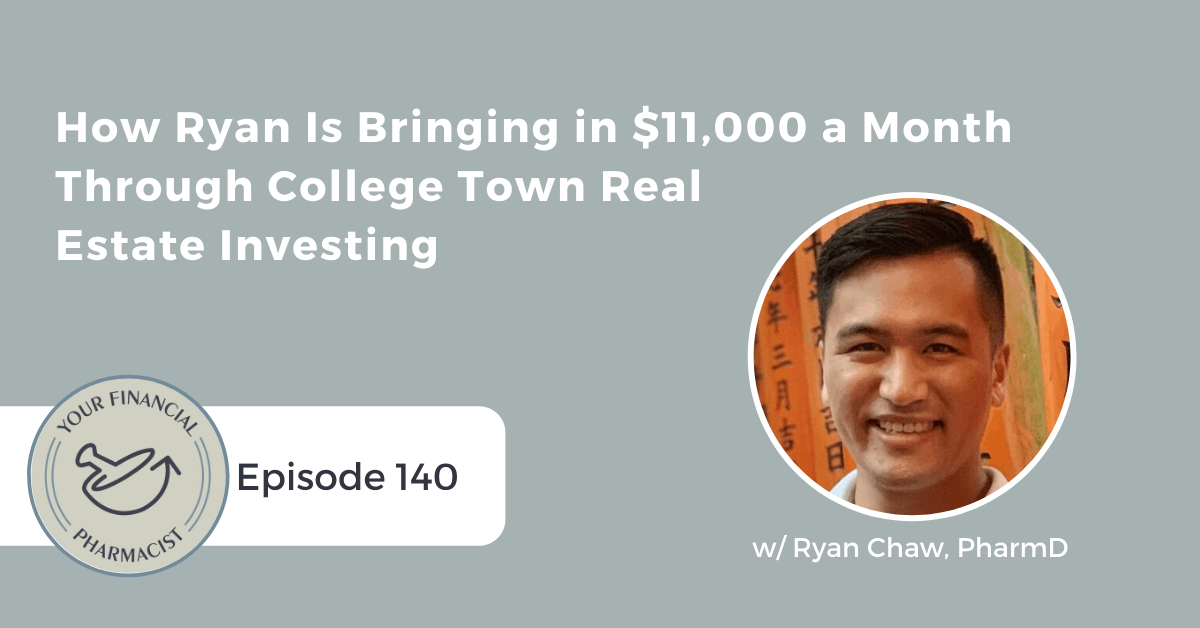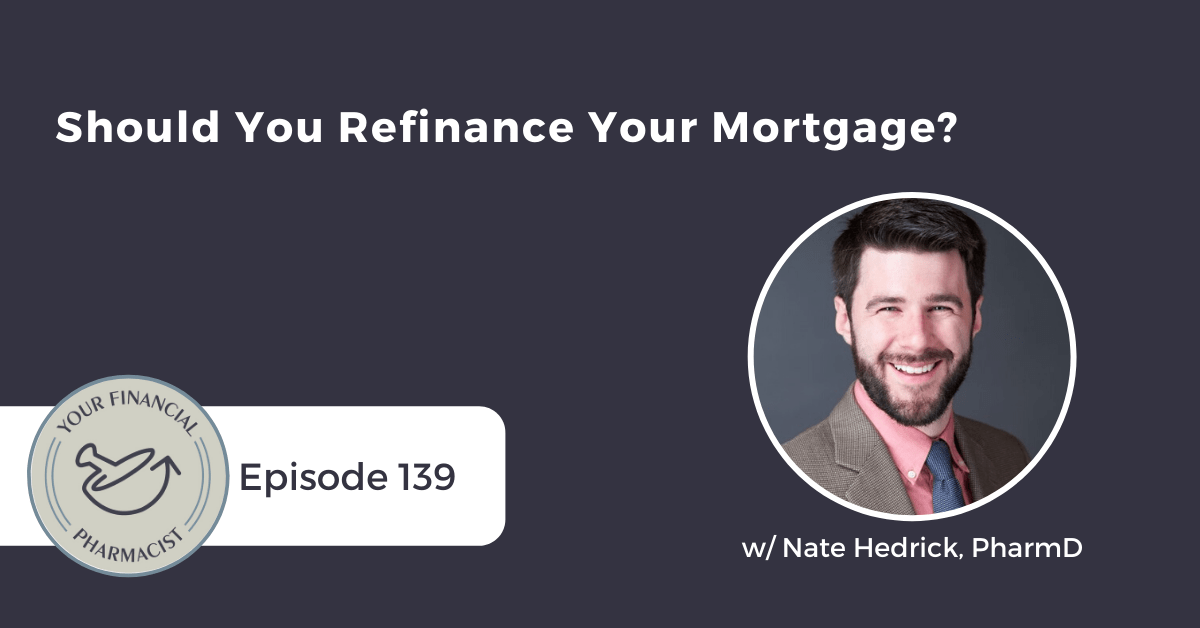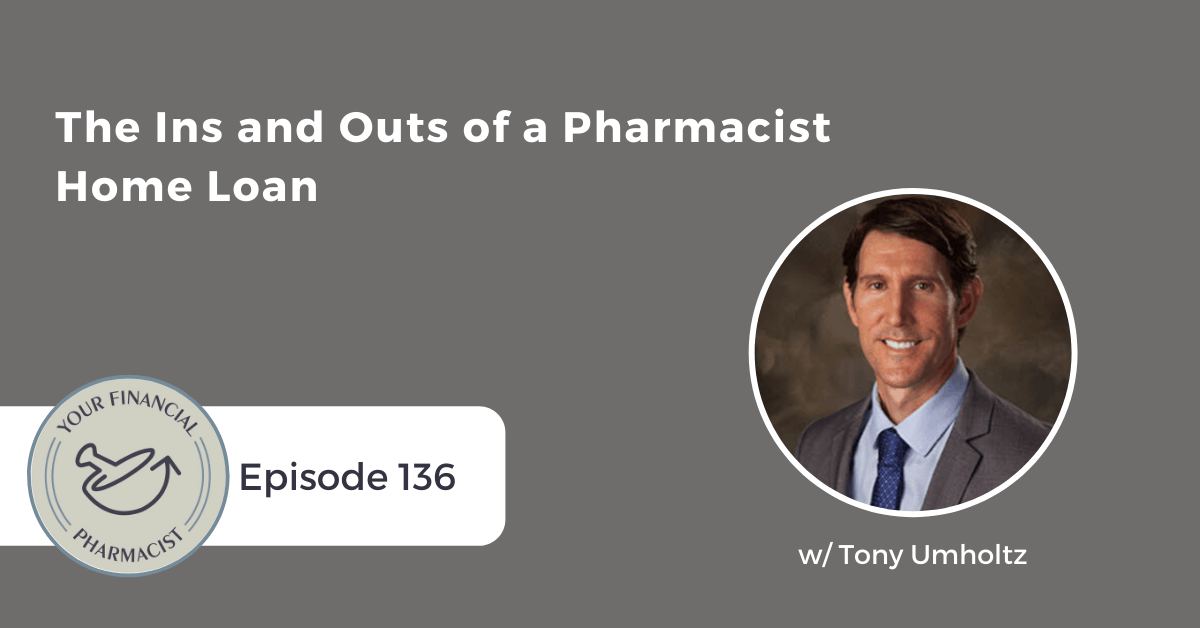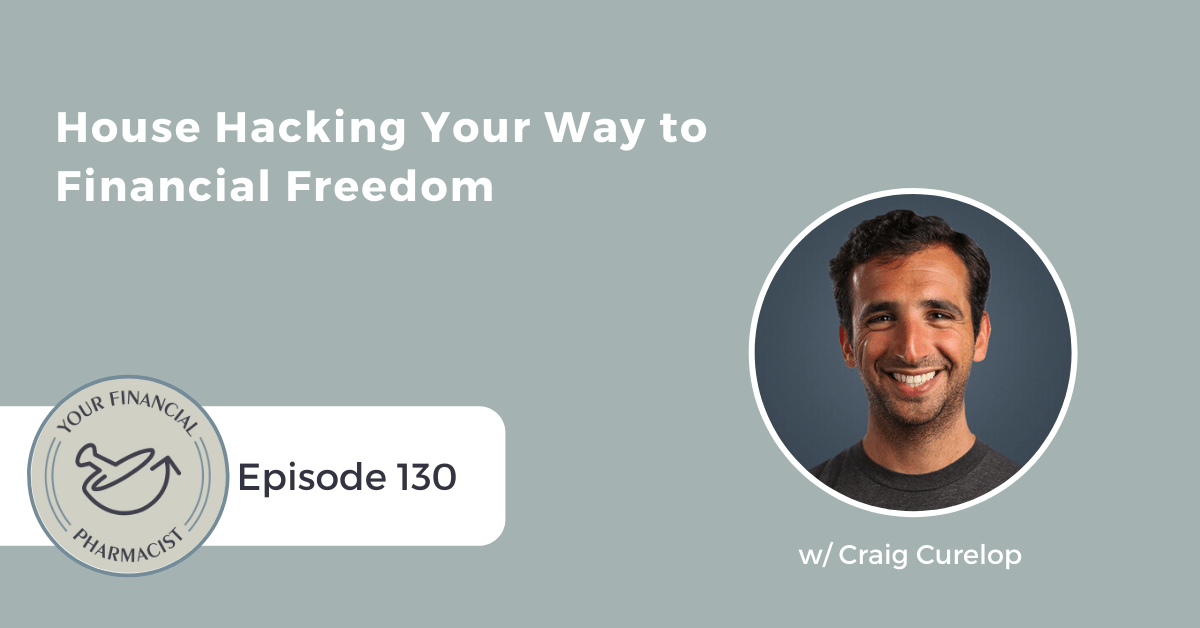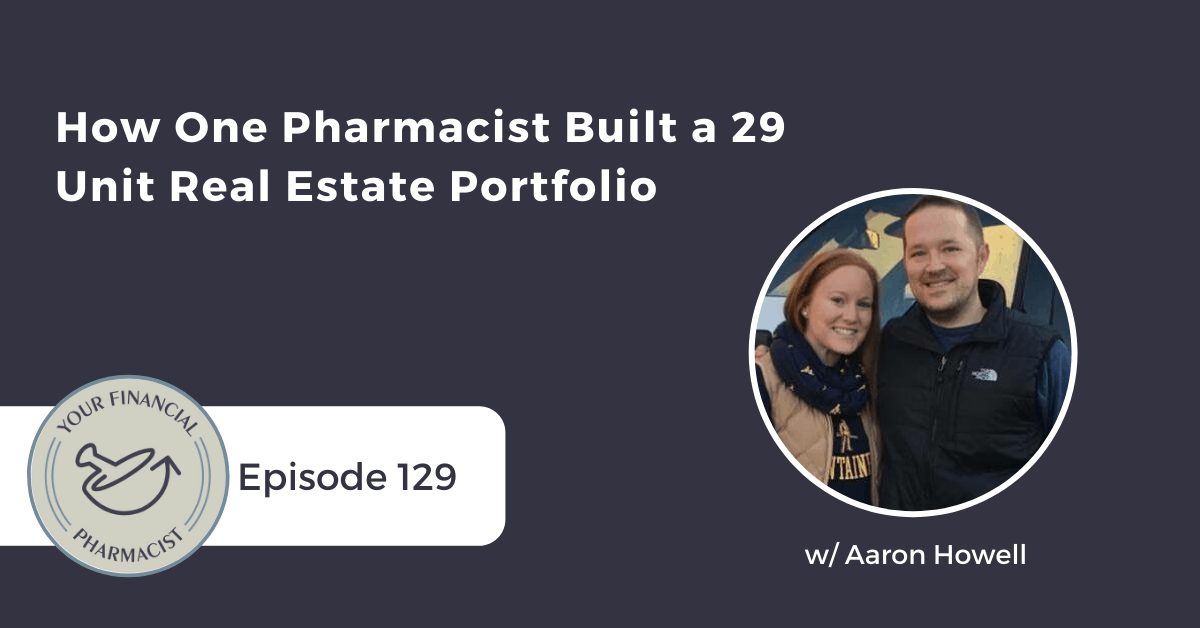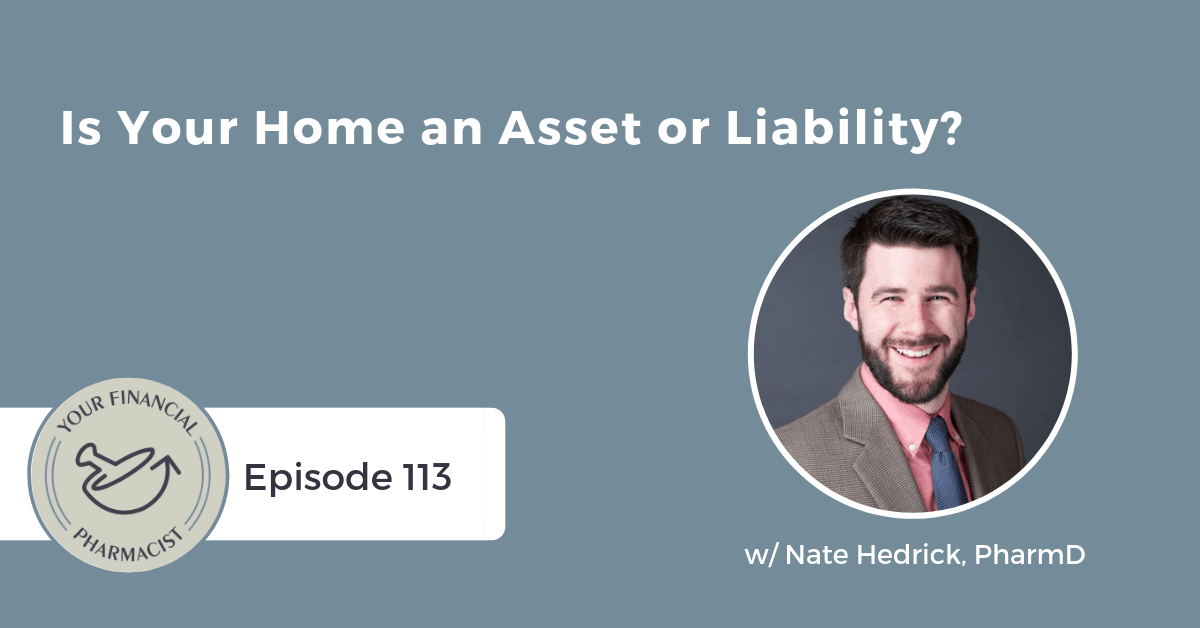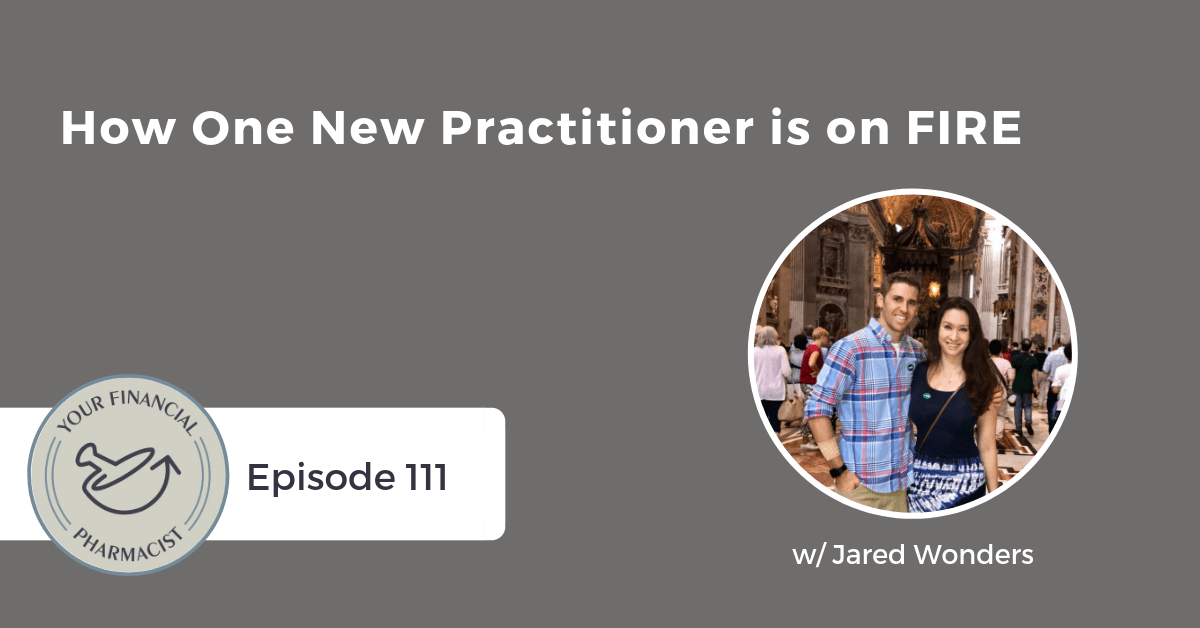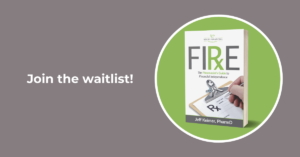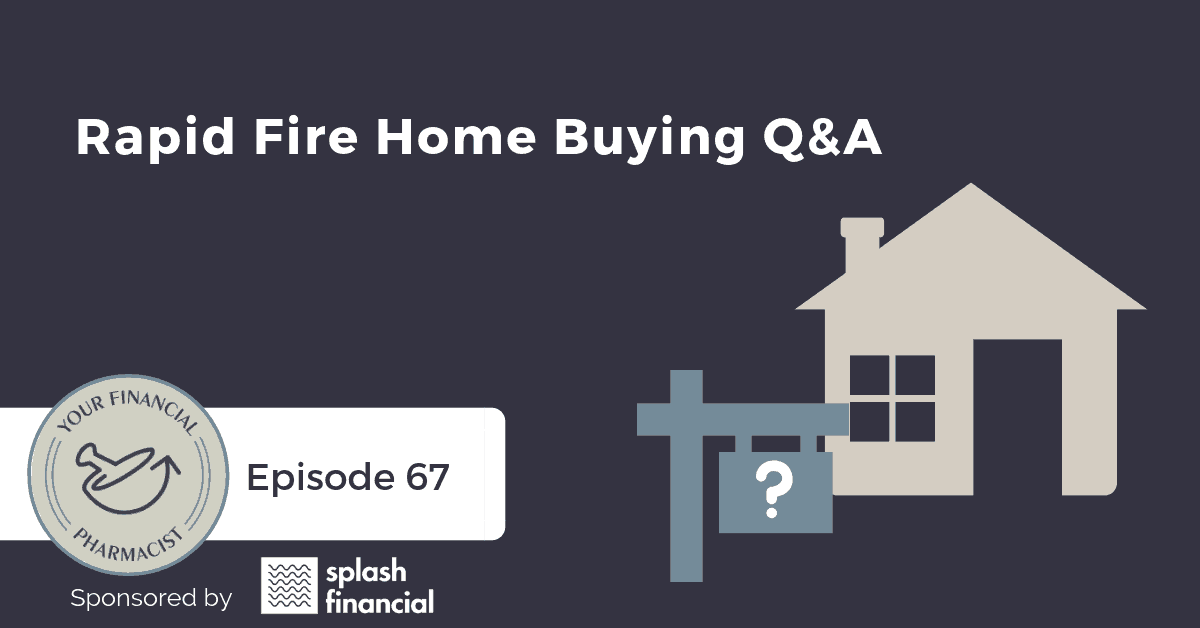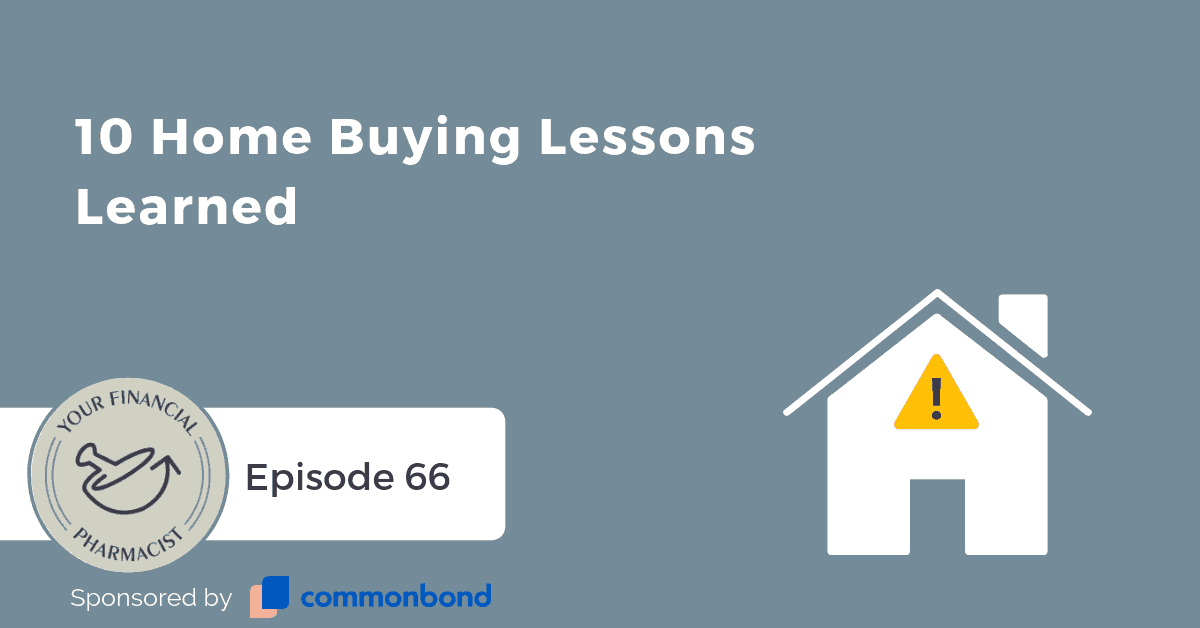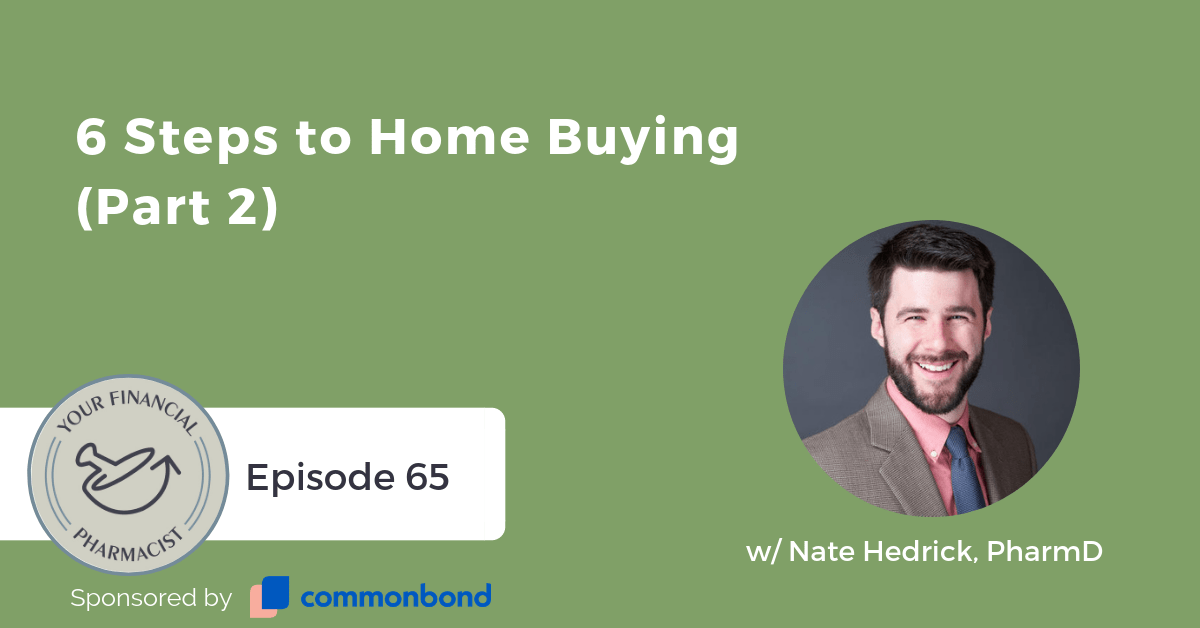How Ryan Is Bringing in $11,000 a Month Through College Town Real Estate Investing
Ryan Chaw, clinical pharmacist and real estate investor, joins Tim Ulbrich on the show. They talk about how Ryan was able to accelerate his financial goals through real estate investing and how he went from zero rentals and zero rental income to $10,755 per month from 18 tenants in four years.
About Today’s Guest
Ryan graduated with his Doctor of Pharmacy in 2015 at age 23.
He was inspired by his grandpa who bought 3 properties in the Bay and achieved financial independence for himself and was able to help cover college tuition for his grandchildren.
Ryan bought his first property in 2016. It was a single family home at his local college. He rented out the house per bedroom and renovated to add extra bedrooms to increase rental profit.
He repeated the same process for each property, buying 1 property each year. He then created a system for getting consistent high quality tenants, managing the tenants, and decreasing expenses through preventative maintenance. He now makes $10,755 per month in rental income.
Three of the properties are on 15 year mortgages and one is on a 10 year mortgage. Ryan took a HELOC out on the first house to help buy the 4th house.
Ryan is now teaching others his system: how to find a college town to invest near, analyzing a deal, generating tenant leads through strong marketing, and how to self-manage college tenants so everything is hands off and automated.
In his free time Ryan travels to many foreign countries to just absorb the culture and life outside of California. So far he has been to China, Japan, Taiwan, the Bahamas, Canada, Paris, London, Germany, and Mexico.
Summary
Ryan, a clinical pharmacist and real estate investor, quickly found his investing niche: college town real estate investing. Ryan started investing in real estate right after he graduated from the University of the Pacific. He now owns four single family homes in Stocktown, California, a college town, and has 18 tenants. By renting out each room individually, Ryan has maximized his income and brings in $10,755 per month.
Ryan’s grandfather owned a couple of rental properties in the Bay Area which not only funded his early retirement but also paid for Ryan and his brother’s college tuition. Ryan saw how impactful real estate investing could be and has the goal of reaching financial freedom so he’s able to do what he wants to do and provide for his family without money restricting his freedom.
Ryan purchased his first rental property in 2016 and has bought another single family home each year after. In high school, he worked a couple of jobs and saved all of that money in mutual funds. After 5 to 8 years, that money turned into $30,000. For his first rental property, he put around 25% down and took out a 10 year mortgage. He also worked overtime at his pharmacy job to help fund it. He purchased his first rental property for $262,000. Ryan receives $2,600 a month in rental income and has a $1,900 mortgage payment.
With the cash flow he brings in from his rental units, he makes sure his emergency fund is funded and averages that he’ll need about $100-200 in expenses monthly for each house. Ryan uses the leftover cash flow to fund his next property.
Ryan said that he thinks investing in student rentals in college towns can maximize your income the most in a single family home. Even though homes are expensive in California, he’s still able to have a cash flow from his properties. In this episode Ryan also discusses how he looks for tenants, handles complaints from tenants about other tenants, and how he built systems and processes.
Mentioned on the Show
- YFP Fellowship – Apply Today!
- Seven Figure Pharmacist by Tim Ulbrich, PharmD and Tim Church, PharmD
- BiggerPockets
- BiggerPockets Real Estate Investing Podcast
- How to Invest in Real Estate: The Ultimate Beginner’s Guide to Getting Started by Brandon Turner
- The Millionaire Real Estate Investor by Gary Keller
- Rich Dad Poor Dad: What the Rich Teach Their Kids About Money That the Poor and Middle Class Do Not by Robert Kiyosaki
- Think and Grow Rich by Napoleon Hill
- Miracle Morning: The Not-So-Obvious Secret Guaranteed to Transform Your Life (Before 8 AM) by Hal Elrod
- Newbie Real Estate Investing
- Join Ryan Chaw’s Facebook Group
Episode Transcript
Tim Ulbrich: Hey, what’s up, everybody? Welcome to this week’s episode of the Your Financial Pharmacist podcast. It is my pleasure to welcome Ryan Chaw onto the show to share his experiences with real estate investing. Now, as you know, we’ve mentioned real estate investing as a goal we have for 2020 in terms of bringing more information, more examples, more stories, to the YFP community. And today is another great one for you in this area. Ryan has a unique niche of real estate investing in California in college town real estate investing. He’s doing it well in a high cost of living area, and I think his work could translate well to other parts of the country. Furthermore, he is setting out to teach others his game plan and how real estate investing can help accelerate one’s path towards financial freedom. Ryan, welcome to the Your Financial Pharmacist podcast.
Ryan Chaw: How’s it going, Tim? I’m honored to be on the podcast.
Tim Ulbrich: Thank you so much. So glad that you reached out to me, really, really inspirational hearing the work that you’re doing. I’m excited to share that with our community as well. Let’s start with your career in pharmacy, and then we’ll dig into the real estate investing. Tell us a little bit more about your pathway into pharmacy, where you went to school and the work that you’re doing now.
Ryan Chaw: Yeah, so I graduated from the University of the Pacific in Stockton, California in 2015. Soon after that, I started working for RiteAid, and I did a part-time job at Kaiser and eventually ended up doing full-time at Kaiser. And now, I am an infectious disease pharmacist full-time at Kaiser. And from there, I just started investing in real estate. I saved up a lot for a down payment, I worked a lot of overtime, and I also had some money in mutual funds as well, so I just put 20% down on that first property in 2016 and then I rented out per room to college students to maximize my profits. Then I just bought one — I repeated the model. I just bought one each year, and now I’m at four single-family homes with 18 tenants and $10,755 in rental income.
Tim Ulbrich: That’s awesome. And we’re going to dig in to dissect that much further. You know, I think for people that are hearing that that are thinking about real estate investing, it can seem somewhat overwhelming why you went from just starting to, as I mentioned in the introduction, you just mentioned, four units, 18 tenants, roughly $11,000 of real estate income. And we’re going to talk about how you got from where you started to where you are today, really try to break down that plan. But tell us about the why, the inspiration. You know, where did your motivation come from to say, ‘I want to do real estate investing.’ And not even necessarily where you see the long-term, talk about that, but even to take that first ‘risk,’ that first step, that first property, what was the motivation and reason of doing that?
Ryan Chaw: I would say financial freedom, honestly. I just wanted freedom to kind of do what I would like with my life, have more flexibility in my life, be able to provide for my family down the line without having to worry about financials and have money restrict my freedom. So that was the goal for getting into this because eventually, this rental property portfolio will provide me passive income that will pay for all the bills and also allow me to, you know, take vacations, travel, and all of that.
Tim Ulbrich: And so, you know, as I think about your journey, your story, obviously you’re in a higher cost of living area, so you know, I don’t — as someone who is in Ohio, I think wow, real estate, California, crazy expensive, do the numbers even work? But tell me more. So I love the connection of financial freedom. But why real estate investing? I mean, other ways you could have just squirreled money and saved, you could have done other types of investing, you could have started a business. What was it specifically about real estate investing that really peaked your interest to use this as the vehicle to achieve that goal of financial freedom?
Ryan Chaw: I would say part of it actually is — because when I got to pharmacy, I wanted to provide a service for people. It’s the same idea for real estate investing. You’re providing a service for people. And I do interact with my tenants, and some of them I actually help out through the college because I actually went to UOPA as well. So just kind of giving back to that community is one reason why I did this. Another reason why is real estate investing is one of really the best ways to have true passive income and a good amount of it. If you were to invest in stocks, you would need to make — you would have to have like a several million dollar portfolio to get $10,000 a month in passive income in dividends. Right? But real estate, you can achieve it a lot faster, it’s truly a way to create generational wealth. I was actually inspired by my grandpa to get into it originally because he invested in a couple properties in the Bay area when they were cheap, right? And now they just went skyrocketed, right? So the rental income from that paid for not only his life in order for him to retire early but also paid for my college and that of my brother’s as well, so I really realized, this is a great way to create generational wealth.
Tim Ulbrich: I love that. So his experiences in doing real estate investing allowed you to get a jump start in terms of your financial plan by not having the massive debt load we see with lots of pharmacists, which allowed you to accelerate your savings. But even without the $170,000-200,000 of debt that we see with today’s graduate on average in the pharmacy world, I still don’t want to mitigate that it doesn’t mean there wasn’t hard work that was done to get to that first property. You know, often the objection I hear — and I know my wife Jess and I, we really felt like the hump of the first one is so difficult to get over, but for those that are listening or have listened to the Bigger Pockets podcast, they talk about this all the time of that first property, first property, you just got to do it. But I often hear as an objection — and there’s this disconnect between OK, I like the idea of real estate investing, I want to jump in, but my gosh, like where do I get the cash to even get started? So you talked a little bit about 2016, first property, 20% down, but talk to us, even before we analyze that property and that deal, talk to us about how you were able to save up money. What was the strategy that allowed you to have the cash flow to create the savings to get that 20% down?
Ryan Chaw: Yeah, so I actually worked a couple of jobs in high school during the summer. And I would put all my money, save it away rather than spend it into mutual funds at Edward Jones. And so that grew, that portfolio grew over the course of 5-8 years or so. And eventually when I took it out, it was around $30,000. So that was half of my down payment right there, plus I’m investing not in my directly local market, I’m investing in a city called Stockton, which is about an hour away from me in Sacramento. And the prices there for homes were around the $200,000s when I first started. Now, they’re around $300,000s. But compared to the price in Sacramento, you know, Sacramento costs $500,000 to buy a house. So for me, it made perfect sense, you know, I should just drive one hour away and create this system over in Stockton and then the cash flow would make a lot more sense. And yeah, that’s how I got started.
Tim Ulbrich: Yeah, and what I heard there is hustle and sacrifice, you know. And that was really my next question for you. I think many people, especially our California community members, might be thinking, my gosh, it’s an uphill climb to even be able to afford your own personal property, let alone being able to put 20% down on a second one. So how have you reconciled that to be able to cover your own expenses as well as then obviously be in a position to invest?
Ryan Chaw: Yeah, so part of it was a little bit of luck. First property depreciated like crazy. I bought it for $262,000. And you know California, it depreciates like crazy. So it went up to $315,000.
Tim Ulbrich: Wow.
Ryan Chaw: I was able to take out a HELOC from that to basically help pay for each house down the line.
Tim Ulbrich: OK.
Ryan Chaw: So yeah, that was one strategy I used.
Tim Ulbrich: And before we jump into more of that first property, are you living in one of the properties? Or what’s your situation to be able to cover your own personal living expenses?
Ryan Chaw: Oh yeah, great question. I actually do still — I have a great relationship with my family, so I do live with my parents. But you know, if I were to live outside, I would probably find a cheap, a very cheap place to rent, you know, nothing more than like $800 a month.
Tim Ulbrich: Yeah.
Ryan Chaw: But really, my real estate rents would cover that.
Tim Ulbrich: Yep. I love that, though. I mean, you think about the biggest barriers often and people getting started and this would obviously be their own housing expenses and student loans. And you’ve been able to overcome those barriers plus saving at a very early age, took advantage of compound growth, which allowed you to come up with a down payment, you got that first property, and then as you mentioned, you’ve got appreciation, you’re able to draw on the equity of that to be able to get into future properties. So first property, 2016, I think I heard you say $262,000? Is that correct?
Ryan Chaw: Yeah, $262,000.
Tim Ulbrich: OK. And it appreciated up to $315,000. So talk to us about just the numbers on that, roughly. You put 20% down. Talk to us about the rental situation and just so our listeners can get an idea of, you know, rental income coming in, your expenses and what those numbers look like.
Ryan Chaw: So the first house was basically a cookie-cutter property. It was a three-bed, two-bath, and what I do is I add extra bedrooms where I can. So I’ll either put up a wall or I’ll change an extra living room or family room into a bedroom where I can to maximize the profit because each room can rent out for like $600 a month. So for that house, I’m getting around $2,600 a month. And then for my mortgage payment, it’s $1,900 a month.
Tim Ulbrich: OK.
Ryan Chaw: So that’s $700 in cash flow. And this is on a 15-year mortgage, actually a 10-year mortgage.
Tim Ulbrich: Wow, OK.
Ryan Chaw: Yeah, I actually — I think I put a little bit more, like 25% down, but I did, yeah, a 10-year mortgage and you know, by renting it out per room, it really maximizes that cash flow you can get from the house. And then basically from there, we just reinvest the cash flow into the next down payment, into the next one, into the next one, right?
Tim Ulbrich: Absolutely. Tell our listeners about — a little bit more about why you decided a 10-year aggressive repayment versus a 15-, 20- or 30-year.
Ryan Chaw: I would say, you know, I did hear stories about overleveraging. So I wanted to start off a little bit safe, but then I realized it doesn’t really have to be that aggressive. I think another reason why is my end goal is financial freedom, so I want to pay them off as soon as I can because I want that passive, like complete passive income, you know, $10,755 per month coming in like period for the rest of your life.
Tim Ulbrich: Yeah, and I look at that example — this is a really good one. You know, you mentioned the rent at $2,600 a month across the tenants in that unit. And we’ll talk about the strategy and kind of the college town approach that gives you multiple renters. So $2,600 of rental income, $1,900 a month of a mortgage payment but that’s on a 10-year mortgage. So we fast forward 10 years, property is going to appreciate more, so the actual property will be worth a significant amount, which is a big impact on net worth. And then you get rid of a big part of that $1,900. Obviously, you’ll still have property tax, but you won’t have a mortgage payment. And in theory, rents will go up because of the market that you’re in and appreciation, all of these things. So I think hopefully our listeners start to put together the concept of the financial freedom. Break down a little bit further for me — I see in there $2,600 of rent, $1,900 of mortgage payment. I’m assuming that’s mortgage and taxes and insurance that’s in there as well. What would the rest of that $700, how do you reconcile that, you know — obviously you wouldn’t look at that as just being true profit because you’ve got other upkeep, vacancies, other expenses that you’re accounting for. So how do you determine, you know, what of that money, that $700 difference between $2,600 and $1,900, that you hold for those types of expenses? You know, versus that you account as more true profit?
Ryan Chaw: Yeah, so I always recommend having an emergency fund in case something breaks down, maybe $10,000-15,000 would be a good, reasonable emergency fund. I know some people say like six months emergency fund and all of that, but for me, you know, I do have my HELOC, so if I do have to use that, I can always take it out, which is — it’s basically like a credit card with a very low interest rate. So if I want to do that in an emergency, I could do that. But I would say my expenses are around maybe $200 or $100-200 a month or so average. But it really depends, a lot of times, things — because of the way I set up the house, things don’t break down too often. But when they break down, of course it’s a huge expenditure. And that’s what happened on my first house. I didn’t do my due diligence to make sure that everything was in working order before I bought it. And I made some mistakes, huge mistakes, actually. So one Monday, I got a call from a tenant who was saying, ‘Oh shoot, there’s sewage coming out the kitchen sink onto the kitchen floor.’ And this was like at 11 p.m. at night, right? I was like scrambling to call so many different plumbing companies, and it was hard to get ahold of someone because it was 11 p.m. at night to clean up the mess. So they had to put in a sump pump, they had to sanitize everything. That cost a couple thousand. And then we put a camera down the pipe, the sewage line, and then it was, you know, showed a lot of breaks in the pipes and routes in the pipes, so it cost me $6,000 to replace the whole sewage line.
Tim Ulbrich: Oh, gees.
Ryan Chaw: Yeah, it was crazy. So these things do come up, and they happen if you don’t do your due diligence. And so what I learned from that is during the escrow phase of the house, it’s very important to do a sewage line inspection. So that’s just sticking a camera down the sewage line, costs $200-300, but you know, they’ll find all the breaks, all the cracks and grooves in your pipes if there are any, and then you can use that as a negotiating point during the sale. Either have the seller repair it or have the seller cut a check for you to hire someone to repair it.
Tim Ulbrich: I love that, especially when you consider the cost of something like that, of the repair relative to the cost of the preventative, more diagnostic approach. So that’s great, great, great advice.
Ryan Chaw: Exactly. And I also learned not to buy houses that are over 100 years old when I can because that first house was like 100 years old. Crazy.
Tim Ulbrich: So you know, in California, knowing that you have multiple tenants, you’re in a college town — and again, we’ll talk about that more here in a little bit — do you not have to be as concerned about vacancy rates, you know, that you might see in other parts of the country? Or how do you think through vacancy?
Ryan Chaw: Correct. So I do one-year leases for all of my rooms, all of my 18 tenants. And it’s because the demand is so high for off-campus housing, I only charge $600 a month, right? And on-campus dormitories, they charge $1,000-1,200. So that makes sense for a lot of people. You’re getting more privacy, you’re getting a lot more space, right? And just more freedom in general, right? So a lot of people like that and they see that as a good — for them, a good place to stay. And I usually target third- or fourth-year students when I can. Sometimes I have second-year students stay. I rarely have first-year students stay because of the maturity level. Most of them, they’re already in professional school, pharmacy school, right, so they take — I mean, they mainly use the house to study and sleep.
Tim Ulbrich: Yep.
Ryan Chaw: To be honest, yeah. And not only that, the parents kind of visit them and they help clean up the house, so I cut down on the cleaning costs and all of that too. And so yeah, I do one-year lease. They can always sublease during the summer. Some schools like pharmacy school and dental school, they go year-round, so they actually go through summer. So it makes sense for them to do a one.
Tim Ulbrich: I love that. You know, the two objections I’ve commonly heard for college town real estate investing would be the summer period, but obviously you mentioned the one-year lease and the allowance of subleases or programs that have year-round type of offerings, as well as the potential damage and upkeep for a variety of reasons, you know, maturity and so forth and working with professional students — not that it’s immune to that, but obviously you have a lot better chance I think that they’re going to take care of the property and as many pharmacy students know, pharmacy is a small world, and you should be respectful, right, of somebody else’s property. So talk to us about the strategy of college town investing. I think that’s really the niche you’ve built here. And I think it’s really cool. You know, why? How? And what’s been the strategy that this is an area that you want to continue to go into further?
Ryan Chaw: Yeah, so I was first inspired by actually my friend who did this, his aunt basically bought a property right across the street from campus and rented it out to my friend’s friends. And so my friend basically lived there for free. In fact, if I were to go back, I would do the same strategy because for house hacking where you stay in the house, you can actually put down as low as 3.5% down, so I would have even started with that. But I guess I went into student rentals mainly — like I did examine the different tenant pools out there, but really, student rentals is the best way to maximize your profit on the single-family home because of that you’re renting out per room idea. So one of my houses, for example, appraised to rent out for $2,000. They estimated $2,000 in market rent, right? But I was actually — after I added the bedrooms, I was able to get $3,100 a month. So that house, you know, an extra $1,100 every month made a huge difference in my bottom line. And that’s how I’m able to invest in California where the rental rates — I mean, sorry, the housing prices are so high. If you were to do this in other states, you could get the same rent by $500-700 and the price of the properties are only hundreds of thousand — like $100,000 or $200,000. So the cash flow is tremendous. And that’s why I’m helping others and teaching others how to do this strategy because it’s really a great opportunity, especially in other states.
Tim Ulbrich: And it sounds like, you know, I’m guessing some of our listeners may be thinking about, hey, here we are in a really great, you know, 10-11 year run in the market.
Ryan Chaw: Oh yeah. They get the history, right?
Tim Ulbrich: Yeah, what happens to Ryan if this thing flips on its head? But a few things that I think you’ve done really well to protect yourself against that, obviously, it sounds like you’ve purchased properties at a good price point. You’re in a market that’s going to continue to have demand, regardless of what happens. Obviously being in a college town, you’ve got multiple tenants. You’ve built these year-long leases. But also, you’ve got some of your properties — I don’t know if you have all of them on a 10-year, but because you’ve done that and they’ve appraised and you’ve paid off a significant amount I’m guessing of some of those mortgages on a shorter time period, even that one you purchased in 2016, you’re essentially 3+ years in, so you’ve got this cushion with 20% down and this equity built in that even if housing prices go down, let’s say 10-20% overnight, you’ve really got some protection built in there, right?
Ryan Chaw: Oh yeah. For sure. They say you make your money when you buy, right? So I’ve got to make sure I look at several — oh, let’s say maybe 50 deals or so — just throughout the year. And I buy the best one, right? I constantly look at deals so I know what a good deal looks like. So that’s pretty key.
Tim Ulbrich: And what about getting tenants? What’s been your strategy of having a funnel of people that come to you? And I’m guessing this in part has to do with the relationships that you have. But how have you done that I guess initially? And then is there a point where, you know, after you have a good reputation with these students that I think it would be somewhat of a word-of-mouth of kind of passing it, you know, off to the next group that’s coming after they graduate?
Ryan Chaw: Yeah. Exactly. Nowadays, it’s word of mouth. But when I first started out, I did three things: I put signs or fliers up on the campus bulletin boards. That actually worked pretty well. I put a “For Rent” sign on my lawn. I mean, that’s usually how everyone starts out. That actually got me a lot of calls, but they weren’t from students. They were usually from people around the area. And then when I said, “Well, if you were to rent out the whole house, it would be $3,100 a month,” they’re like, “That’s crazy.” So usually, I would get some not very well qualified tenants to that. But then what really helped was the Facebook groups. All campuses have these Facebook groups for off-campus, there’s usually a textbook exchange group, there’s Class of 2020, you know, all these groups. I go onto them, and I write my targeted ads, right? I say, “Hey, we have this place that’s three minutes from campus.” I literally put up the map on there and show them where it’s at relative to their classes. And I get — I would say every time I post an ad, within the first three days, I would get like 10-12 people contacting me. No kidding, this is pretty average.
Tim Ulbrich: Wow.
Ryan Chaw: Yeah. So there’s a lot of people interested. It’s a huge market. You think about it, UOP I think has 7,000 students or so. I only need 18 of those. That’s like .1% of them, right? So yeah. It’s a great market.
Tim Ulbrich: Let me pick your brain on process. You know, as I’m hearing this — and I’m guessing our listeners as well — I hear you talk about things like advertising your properties and responding to interest and dealing with the sewage pipe issues at 11 o’clock at night and having to think about the strategy of finding these deals and you casually talk about adding rooms and putting up walls. And I’m guessing many people are like, oh my gosh, I just can’t even wrap my mind around —
Ryan Chaw: Right.
Tim Ulbrich: — how to process this. Tell me a little bit about your process, your team, what you’re doing versus maybe other things that you’ve really leaned on others to do.
Ryan Chaw: Yeah. So yeah, putting the systems and processes in place is key, so I’m glad you mentioned that. So I have a process for everything. Rental payment, I do through Zell. I require them to use an app called Zell. It’s a direct deposit app, so I don’t have to deal with a check being lost in the mail, right? And it tells you exactly when they pay their rent so I know when they’re late or not so I can charge the late fee if they’re late. Just putting everything in the lease, being very clear, having all clear, set terms and the wordings clear for any potential issues that could arise. Then you just refer back to the lease when the issue happens. I also have a system in place for like managing the properties if something breaks down. So if something breaks down, the tenant will typically send me a text. They’ll say the toilets not working. And so what I do is I just forward the text to my contractors. And I have a team of three contractors. One of them is more creative, he’s the one I use to help build walls and maybe create a hallway if I have to. He’s the creative guy. The other two, they’re more for like run-of-the-mill things like replacing a toilet, putting in a sump pump, things like that. But basically, I just forward a text to them. And then they let themselves in with the electronic lock on the door. So they just put in that code, right, let themselves in, do their job, they go home, and then I have someone else take a look at the work. And they just tell me, yeah, he fixed the toilet or whatever. And then he sends me the bill, and I send him the check. That’s it.
Tim Ulbrich: Awesome. Awesome.
Ryan Chaw: You know, I haven’t been down to Stockton in over seven months now. Right? So it’s great. Everything’s pretty automated.
Tim Ulbrich: And I think it’s hopefully an encouragement, you know, to me, to our audience, that the systems, the processes, you’ve built a lot of this, I can tell, over time. And as I talk about, again, they mention all the time on Bigger Pockets, really not hearing stories like this and feeling overwhelmed but just thinking about that first process. And there will be mistakes, you know, that’s part of the learning.
Ryan Chaw: Yes.
Tim Ulbrich: And really figuring out what the system and process, figuring out what you want to do yourself, what you want to hire out, what capacity you have time-wise, what’s the margins on the properties, you know, all of those things are really important. Now, considering your model where you have several tenants in a property, several students, I have to imagine you run into tenant issues, you know, just by nature of having people involved, probably often even between one another. Tell me about the issues that come up and how you handle those and deal with those.
Ryan Chaw: Great question, Tim. Yeah, so sometimes, you’ll get tenants complaining about other tenants about noise, maybe the other tenants smoking pot or something like that. And what you do, what I learned, actually — and I learned this the hard way — is you want to have the tenant talk to the other tenant face-to-face. Because if I go and call that other tenant, say, ‘Hey, this other guy complained about you,’ then the situation gets worse because the guy is saying, ‘Hey, you talked behind my back. I can’t trust this guy.’ So the situation actually escalates if you do that. So first, have them have a face-to-face discussion. And then if there’s still issues, then you can call up the tenant personally. And then if that still doesn’t work, you can call the parent because all these college students, they have parents, right? And usually after you call the parent, it gets straightened out pretty quickly. But I’ve only had to resort to calling the parent one time throughout my four years of investing. And most of the times, as long as you empower — and that’s the key. You have to empower the tenants that they’re adults now, they need to resolve these issues face-to-face with the other tenants. And once they kind of have that — once you empower them, then the issues get resolved very quickly. In fact, that’s all I have to do nowadays is just I’ll ask them to talk face-to-face. And after that, I don’t get any texts or phone calls or messages or anything like that.
Tim Ulbrich: I think that’s great advice. I didn’t learn that lesson in the real estate world. I learned that lesson in the academic pharmacy in terms of managing other individuals. But I think you’re spot-on. I mean, the second two individuals have an issue with one another and you jump in with one of them but they don’t talk face-to-face, things often get worse in the short term.
Ryan Chaw: Yes.
Tim Ulbrich: And even though the difficult conversation is difficult, it’s important to be had. What resources would you recommend to our listeners that are hearing this and saying, ‘Wow, I’m really inspired by Ryan’s story. I’m interested, I want to learn more.’ Podcasts, books, blogs, what is out there that you draw information from?
Ryan Chaw: Yeah, so Bigger Pockets actually has some great books on rental property investing to get you started. There’s one by Brandon Turner I think on rental property investing. But there’s also some great books for like mindset and kind of theory as well. I would say “The Millionaire Real Estate Investor” by Gary Keller is really good. That one teaches you how to build your teams and forms of that, of creating systems in place. There’s also “Rich Dad, Poor Dad,” of course. That’s a very inspirational book if you guys haven’t read that one. “Think and Grow Rich,” there’s “The Miracle Morning.”
Tim Ulbrich: Great book.
Ryan Chaw: I like that one. That was a great book, yeah, exactly. It teaches you how to take charge of your day. You know, journaling, meditation, those types of things to get your mind in the right place to really handle stressful situations if something comes up.
Tim Ulbrich: I’m really glad you gave some books that were around kind of more of the mindset, you know, morning routine types of things because I think while the x’s and o’s are important, the theme that I’ve now heard as we’re now 140-something episodes into the Your Financial Pharmacist podcast is, you know, those interviews that I reflect on afterwards and say, “Wow, there’s just something really special, something different, something unique in terms of how somebody’s operating, how they’re growing what they’re doing,” the consistent theme I see with you and others that I would say are really, really successful is this concept of mindset. And it’s just different. And I think it’s often this constant quench and desire to learn and to grow and naturally from that, you will see growth that will happen in a variety of areas. It could be business, it could be family, it could be many different things. So I know that you are kind of in this phase where you’re beginning to teach others how to do this, which I think is really cool. So tell us a little bit about that, you know, kind of what your vision is for that, and where our listeners can go to connect with you and learn more.
Ryan Chaw: Oh yeah, for sure. So I believe student housing — the student rental market is the best way to invest in single-family homes, hands down, because you can make the most profit. So I’m teaching others how to do this. I walk them through the whole deal analysis process to make sure everyone gets a good deal. I walk them through the renovations we make. We try to of course eliminate, do preventative maintenance for possible — like eliminating grass and replacing old mulch and cutting out trees and trimming branches and all of that. And then I walk them through the whole marketing process to get tenants in consistently and to screen them and how to manage issues down the line. And they can reach me at — or you guys can reach me at www.newbierealestateinvesting.com. That’s www.newbierealestateinvesting.com. And newbie is spelled newbie. And I have some great resources, you guys can put in, sign up for the newsletter, and I’ll send you some great information. I even have like a deal analysis calculator you guys can take a look at. It’s kind of like the Bigger Pockets one, but it’s more simplified and it has an amortization schedule and everything. And then I also have a great resource you can read through on the different areas of real estate investing because it’s not just student rental housing. Of course, I love that area. But there’s also fixing, flipping, there’s Airbnb, which is also known as short-term rentals. There’s apartments. But really, I think most people, the ones who aren’t millionaires or billionaires or whatever, the best place to start really is single-family housing and just doing the renting out per bedroom house hacking strategy.
Tim Ulbrich: Great stuff, Ryan. I really appreciate you taking the time, and I have a feeling this won’t be the first time that our audience will hear from you. So excited to see what comes for you in the future and as I mentioned to the community, we’re going to keep bringing more examples, stories, hopeful that will give our community some ideas of things to think about. I think this is another great example of a pharmacist who’s doing some really incredible things and is successful. So congratulations on the success that you’ve had. And thank you again for taking time to come on the show.
Ryan Chaw: Hey, thank you, Tim. I’m excited to be able to get on your podcast. Thank you.
Tim Ulbrich: Awesome. And as always, if you like what you heard on this week’s episode of the Your Financial Pharmacist podcast, please leave us a rating and review on Apple podcasts or wherever you listen to your podcasts each and every week. We appreciate you joining us. Have a great rest of your week.
Current Student Loan Refinance Offers
[wptb id="15454" not found ]Recent Posts
[pt_view id=”f651872qnv”]

